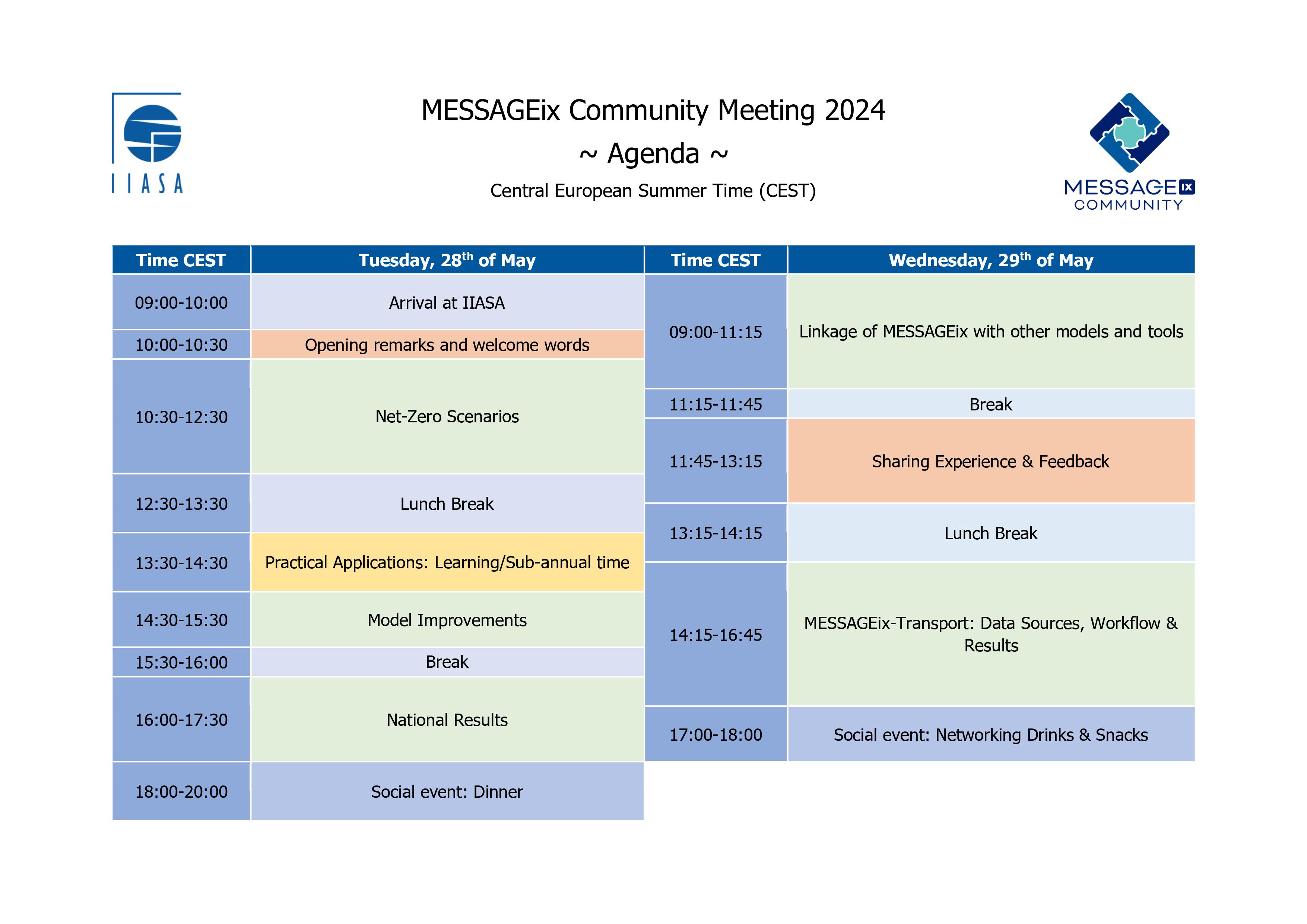
The Energy, Climate, and Environment (ECE) Program will host the third MESSAGEix Community Meeting in May 2024. The meeting aims to bring together researchers working on integrated assessment and/or energy system modeling using open source software.
The MESSAGEix Community Meeting is a platform for showcasing new developments and features of the MESSAGEix modeling framework, sharing knowledge on various modeling approaches and applications of the framework, and discussing best practices in model-based policy analysis. The meeting is a place for facilitating collaboration between MESSAGEix users from around the world, by creating a forum where users can share their latest research outcomes and modeling experiences.
The Community Meeting also aims to inspire new users of the MESSAGEix framework on the range of available possibilities and link them with other users in order to help them advance their modeling work.
With this third meeting, we hope to further grow and sustain the MESSAGEix community who is already contributing to major international assessments and many scenario studies at global, national, and subnational scales. Sharing knowledge and mutual support will help find new ways to apply modeling for offering solutions to complex problems related to climate change mitigation, impacts, adaptation, and energy as well as broader sustainability transitions.
For attending the meeting and receiving related material, please kindly fill in the online registration form. The meeting will be in a hybrid format, with the possibility of attending online or in person.
Below, we provide a draft agenda, which is subject to minor changes based on the availability of presenters. Please revisit this webpage closer to the dates of the meeting for a more updated agenda. All times are in Central European Summer Time (CEST).
Please note that the agenda is preliminary as of now. It will be updated closer to the meeting date, so please revisit this page then.
By popular demand, we have again asked all presenters to please send us (a draft version of) their presentations prior to the meeting so that you can already study the presentation materials beforehand and can focus more on the talk during the talk. Please see the collection of presentation materials to find out if the talk you are interested in has already been uploaded. We will update this collection whenever we receive new material.
Please note that only people who filled out the registration survey are able to see the collection.
Detailed Agenda - Tuesday, May 28:
Opening remarks and welcome words
10:00-10:30: Opening remarks and welcome words
A warm welcome and introduction to this year's MESSAGEix community meeting delivered by Volker Krey, Fridolin Glatter, and Paul Natsuo Kishimoto (all IIASA).
Net-Zero Scenarios
10:30-11:00: Technological options and critical constraints of India's target of Net zero in Power sector
Probal Ghosh (Integrated Research and Action for Development, India)
11:00-11:30: Meta-analysis of the Turkish energy scenarios to achieve the net-zero target
Görkem Güngör (Hacettepe University, Turkiye)
The presentation is on the findings of the Turkish research team during an international research project on the role of nuclear power in climate mitigation strategies between 2016 and 2020. The team used MESSAGE for modelling the energy system from resources to final energy demand. The global modelling results used for the IPCC AR5 (Fifth Assessment Report) were selected as the baseline to estimate the final energy demand pathways until 2050. The revenues accumulated by carbon taxes imposed on fossil fuels supplied the investment in renewable energy. The findings revealed that nuclear power has a potential role in the clean power transition, with the achievement of the net-zero climate target requiring a high share of renewables.
11:30-12:00: Role of energy trading in future low carbon scenarios in North-East Asia
Jintae Kim (Seoul National University, South Korea)
This study developed a model to enhance a global energy model, specifically focusing on Northeast Asia (NEA), a region with significant economic growth and climate impact. By expanding the model to include six NEA countries(KOR, CHN, JPN, RUS, MNG, PRK), it reveals differing outcomes in carbon reduction scenarios compared to the base model, emphasizing increased costs in a trade-driven energy system under climate policies. It stresses the importance of prioritizing renewable energy over coal-to-natural-gas substitution for stringent climate goals.
12:00-12:30: Modeling zero carbon pathways for energy intensive sectors at national and city levels
Shaohui Zhang (IIASA)
Practical Applications: Learning/Sub-annual time resolution
13:30-14:30: Application of learning module in MESSAGEix
Yoga Pratama (IIASA)
13:30-14:30: Representation of intra-annual variability in a MESSAGEix scenario
Behnam Zakeri (IIASA; Vienna University of Economics and Business, Austria) & Julian Hunt (IIASA)
Representation of variability in energy systems and integrated assessment models is an important topic; whether this would be the availability of variable renewable energy sources, such as wind and solar, in different time scales, the seasonality of hydropower, or the time-of-the-day dependency of energy demand. This session shows how sub-annual variability can be represented using MESSAGEix modeling framework. The way of specifying MESSAGEix sets and parameters in a model with sub-annual time slices will be illustrated and different modeling techniques for representing variability will be discussed. A few examples from published projects will be highlighted, including relevant resources (code and data) to be used by the Community.
Model Improvements
14:30-15:00: Technoecomomic costs projection
Measrainsey Meng (IIASA)
15:00-15:30: MESSAGEix-Materials: low carbon options in cement and steel sectors
Gamze Ünlü (IIASA)
National Results
16:00-16:30: Sub National Low Carbon Policy Analysis in India
Anindya Bhattacharya (The Celestial Earth, India)
16:30-17:00: Comparison of the two case studies: Bhutan and Mexico City
Miho Kamei (Institute for Global Environmental Strategies, Japan)
Bhutan has experienced the climate crisis due to its mountainous and glacial terrain. The 1.5-degree scenario is a tipping point for glacial melting and water stability in Bhutan. Mexico City, on the other hand, has a very long history tackling with climate impacts on its prosperity and the decline of civilisation since Teotihuacan and the Aztec empire. The two cases are situated in the very different global contexts of Asia and Latin America. Projections of key future climate risks and key elements of sustainable development will be discussed using the SSP scenario framework.
17:00-17:30: Modelling Canada's energy system pathways using MESSAGEix
Muhammad Awais (IIASA) & Colleagues (University of Victoria, Canada)
Detailed Agenda - Wednesday, May 29
Linkage of MESSAGEix with other models and tools
09:00-09:45: Integration of energy system and computable general equilibrium models: An approach complementing energy and economic representations for mitigation analysis
Osamu Nishiura (National Institute for Environmental Studies, Japan)
09:45-10:15: Renewable Energy Assessment
Siddharth Joshi (IIASA)
10:15-10:45: Renewable energy integration in MESSAGEix-GLOBIOM: Softlinking with PyPSA-Eur
Ebbe Kyhl Gøtske (Aarhus University, Denmark)
In this work, we first perform a diagnostic comparison between the capacity and energy mix in the two models MESSAGEix-GLOBIOM and PyPSA-Eur.
This is followed by a soft link, where we update the storage technology portfolio in MESSAGEix-GLOBIOM and its impact on the renewable curtailment.
10:45-11:15: Endogenous simulation of low-carbon lifestyle change in global climate mitigation pathways
Hazel Pettifor (University of Oxford, UK) & Alessio Mastrucci (IIASA)
In this presentation we will showcase the endogenous coupling of MESSAGEix_Buildings with LIFE, an empirically based model of low-carbon lifestyle.
Sharing Experiences
11:45-12:45: Sharing Experience from working with MESSAGEix
Contributions welcome from everyone!
Short presentations from Anindya Bhattacharya, Probal Ghosh, and Sanchit Agarwal (The Energy and Resources Institute, India).
12:45-13:15: New developments from the MESSAGE team
Siddharth Joshi, Oliver Fricko (all IIASA)
Promoting the MESSAGEix training workshop and presenting the SSP update process, among other things.
MESSAGEix-Transport: Data Sources, Workflow & Results
14:15-14:45: Workflow and Calibration of MESSAGEix-Transport, NGFS, MESSAGEix-IL-Transport
14:45-15:15: Transport Energy Nexus - The interplay Between Alternative Fuel Vehicles and Consumer Preferences for Israel
Ayelet Davidovitch (Tel Aviv University, Israel)
15:15-15:45: Calibrating MESSAGEix-Transport for SSP 2024
Aneeque Javaid (IIASA)
15:45-16:15: MESSAGE-Transport diagnostic analysis based on Life cycle cost
Takuya Hara (IIASA)
16:15-16:45: International shipping en route to net-zero by 2050
Diogo Kramel (Norwegian University of Science and Technology, Norway)
16:45-17:00: Closing Remarks
Closing remarks for the Community Meeting delivered by Volker Krey.
Upcoming Events
Potsdam Institute for Climate Impact Research (PIK) & Online
German IIASA Networking Event: "Systems analysis for a sustainable and peaceful future"
Online and Austrian Academy of Sciences (Doktor-Ignaz-Seipel-Platz 2, Vienna)
Human Agency to Navigate the Anthropocene
Humboldt University of Berlin



